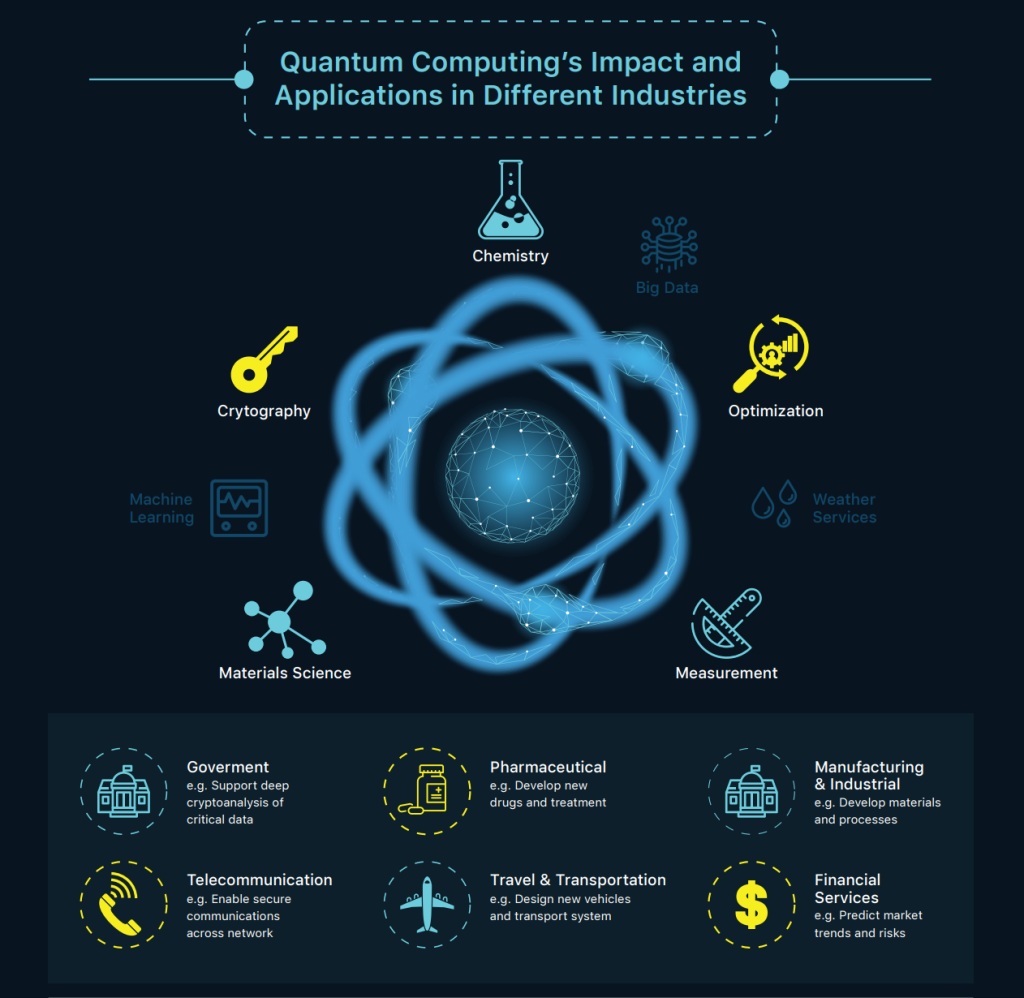Quantum computers represent one of the most promising emerging technologies of our time. These devices rely on the laws of quantum mechanics to store and process information in a fundamentally different way than is possible using ordinary computation. This allows them to unlock significant computational advantages in many tasks. In some cases, these advantages are so dramatic that quantum computers can efficiently solve otherwise intractable problems. Some notable examples include modelling protein folding for biochemistry, and cracking encrypted personal or government data. The economic implications of devices capable of performing these tasks, as well as the security concerns that they bring, have motivated efforts in both academia and industry towards this technology, which is still in its infancy.
In 2019, tech giant Google announced their achievement of demonstrable “quantum supremacy” – the milestone in which a real quantum computer successfully computed something that would be realistically infeasible on traditional computers. The calculation in question was not any useful algorithm and was explicitly designed to be easy for a small quantum computer and difficult for traditional computers. However, for each milestone that quantum computing hardware companies reach as they improve their fabrication and design, the world gains incremental access to the eventual promise of the technology, as each milestone will enable increasingly complicated tasks.
Researchers are also working to improve the quantum algorithms relevant to each industry application, which could make them calculable on smaller quantum computers. As time goes on, we can expect to see industry segments become quantum-enabled one by one. This would take place as the state of quantum hardware, and algorithms reach commercial viability for tasks critical to their businesses; this is reflected like the forecasted economic impact of quantum computing. Upon entering the ultimate milestone of “fault-tolerance,” which is incredibly unlikely at least in the coming decade, nearly every business will see some commercial and competitive advantage in having access to a quantum computer.
Quantum computers today are not yet general-use computers; they are accelerators that can process a limited number of algorithms at speeds impossible for today’s computers. This feature will soon transform specific industries, namely sectors that leverage artificial intelligence and pattern recognition, molecular chemistry, and encryption. For example, quantum computers can simulate the chemical composition of materials and pharmaceutical compounds, leading to faster discoveries of new materials and personalized medicine. Companies in any computationally and algorithmically heavy industries should invest in quantum computing research and development, as the first to license and patent discoveries will hold significant future market power. Gartner estimates that by 2023, 20% of all companies will be budgeting for quantum computing projects.

Despite this, the market of developing and utilizing quantum computers today is led by research groups at universities funded by the world’s governments, while the private sector is just beginning to catch up. In 2020, BCC Research estimates that the market for quantum computing-related services and products is provided almost entirely by research labs, totalling USD 50 million. By 2030, the same report predicts the total market size of quantum computing to be over USD 3.2 billion, with industry customers growing to make up over two-thirds of the market. Established tech giants like IBM, Microsoft, and Google have already made significant investments in developing proprietary quantum technology. Numerous quantum computing hardware startups, such as Rigetti and IonQ, have commanded hundreds of millions of dollars of collective investor attention. The governments of Japan, Israel, and South Korea, among others, have all made multimillion-dollar commitments to the field. In January 2020 the Government of India announced it would spend over USD 1 billion on quantum computing research over the next five years; this rivals the roughly USD 1.2 billion that the United States and China have each committed over the same period.
The Difference
Understanding why there is so much interest in quantum computing requires a brief understanding of how quantum computers differ from today’s computers and what their consequential impact is. Computers today process information using units of information, bits, which are expressed in binary: 0 or 1. While quantum computers also use bits, quantum bits (qubits) can express not only 0 or 1, but also any particular combination of 0 and 1 simultaneously by using unique properties of quantum mechanics. Putting multiple qubits together in a computation further enables combinations of expressions unachievable by classical computers. This is known as superposition and allows a single qubit to encode significantly more information than the binary bit. This, together with the more complicated phenomena of interference and state entanglement, allows quantum computers to encode and process information in ways that fundamentally change the nature of algorithms. They are not devices that compute the same steps of our classical computers but faster somehow: quantum computers compute results in vastly fewer steps, to begin with.
Gartner Research reports strongly recommend that businesses begin identifying applications of quantum computers within their own business and supply chains. Unfortunately, creating an entirely in-house quantum computing research team is impractical for most companies given the necessary quantum computing hardware and PhD-level staffing needed. Therefore, the few experts in the domain are increasingly recruited into non-research positions to seed efforts that will take years to develop. One of these reports predicts that 90% of organizations will seek some consulting regarding quantum computing by the end of 2023. There are workshops aimed at helping executives prepare and know more about the various technical and business implications of quantum computing.
The authors of this article are representatives of qBraid, a cloud platform which provides an end-to-end solution for learning, building, and deploying quantum algorithms for research and commercial applications. qBraid will be hosting a 3-day executive workshop in September to help you learn how quantum computing will transform your industry and provide consultation on what you can do to stay ahead of the market. You can learn more about their work and a team of experts at qbraid by visiting this link.

Written by Jason Necaise, Quantum Developer at D-Wave Systems Inc. and Nancy Xia, MBA Candidate at MIT Sloan. This article was originally published in The SatSure Newslestter (TSNL) .





Add comment